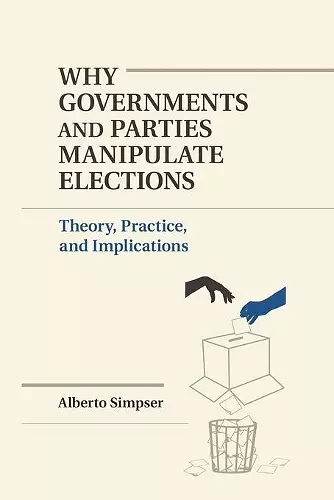Why Governments and Parties Manipulate Elections
Theory, Practice, and Implications
Format:Paperback
Publisher:Cambridge University Press
Published:30th Oct '14
Currently unavailable, and unfortunately no date known when it will be back
This paperback is available in another edition too:
- Hardback£90.00(9781107030541)

Why do parties and governments cheat in elections they cannot lose? This book documents the widespread use of blatant and excessive manipulation of elections and explains what drives this practice. Alberto Simpser shows that, in many instances, elections are about more than winning. Electoral manipulation is not only a tool used to gain votes, but also a means of transmitting or distorting information. This manipulation conveys an image of strength, shaping the behavior of citizens, bureaucrats, politicians, parties, unions and businesspeople to the benefit of the manipulators, increasing the scope for the manipulators to pursue their goals while in government and mitigating future challenges to their hold on power. Why Governments and Parties Manipulate Elections provides a general theory about what drives electoral manipulation and empirically documents global patterns of manipulation.
'In compelling fashion, Alberto Simpser's Why Governments and Parties Manipulate Elections successfully upends the conventional wisdom that election fraud is only about winning elections. With an elegant theory and original data, Simpser shows us that the information provided by manipulated elections may be just as influential as stolen votes, and they can significantly change political participation and perceptions of power. This comprehensive explanation of the causes and consequences of election manipulation throughout the world represents a major contribution to the field.' Susan D. Hyde, Yale University
'Why Governments and Parties Manipulate Elections develops a theory of electoral manipulation that moves the informational role of manipulation to center stage. The 'informational turn' it proposes represents a significant advance in the comparative study of electoral fraud. Most studies on electoral malpractice stress its material effects: governments manipulate elections to win them. Alberto Simpser, by contrast, highlights its communicative role: governments manipulate elections to send messages of strength and resolve. Theoretically innovative and empirically rich, the book offers a commendable blend of formal modeling, statistical analysis, and case studies. It is obligatory reading for all students of elections, political manipulation, and authoritarianism.' Andreas Schedler, CIDE, Mexico City
ISBN: 9781107448681
Dimensions: 229mm x 152mm x 17mm
Weight: 450g
304 pages